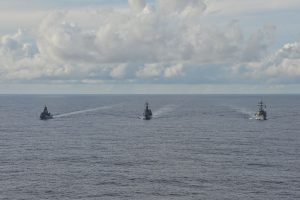U.S., Japan, Australia conduct trilateral naval exercises in South China Sea
From Task Force 70 Public Affairs
SOUTH CHINA SEA – Arleigh Burke-class guided-missile destroyer USS John S. McCain (DDG 56) joined the Royal Australian Navy (RAN) and Japan Maritime Self Defense Force (JMSDF) in the South China Sea for multinational exercises, Oct. 19.
Participants included John S. McCain, JS Kirisame (DD 104) of the JMSDF, and HMAS Arunta (FFH 151) of the RAN. These exercises marked the fifth time of 2020 that Australia, Japan, and the U.S. have conducted operations together in the 7th Fleet area of operations.

Throughout the naval exercises, participants trained together and conducted trilateral operations designed to increase the allies’ collective ability to maintain maritime security and readiness to respond to any regional contingency. Professional engagement and cooperation with allies and partners is the foundation of regional stability, which fosters peace and prosperity for all nations.
HMAS Arunta’s commanding officer, Cmdr. Troy Duggan said Australia was continuing to build on its already close relationship with Japan and the United States.
“This activity is a valuable and important opportunity for all three nations,” said Duggan. “Operating with our partners is essential for building and maintaining high levels of interoperability, and contributes to our shared commitment to the security, stability and prosperity of the Indo-Pacific region.”
Operations together included surface, subsurface, and air defense exercises, and a variety of other training events to strengthen regional maritime security operations.
“We are grateful to have the opportunity of the trilateral exercise with the United States Navy and the Royal Australian Navy. Especially about HMAS Arunta, I feel the connection. Because I had the chance to conduct the exercise with her when I coincidentally was the commanding officer of JS Kirisame in 2014.” said Capt. Yokota Kazushi, the commander, the escort division eight. “For the regional peace and stability, we are making efforts to maintain and develop a free and open Indo-Pacific. The iron bond with our partners is its foundation. Even though COVID-19 spreads, the JMSDF continues to strengthen the relationship with our ally partners.”
Australia and Japan have both fostered long-standing alliances with the U.S., built on shared interests, promoting global security, stability, and economic prosperity through trade, investment, and connectivity.
“By operating with our close allies in this way, here in the South China Sea, we promote transparency, the rule of law, freedom of navigation and overflight, all principles that underpin security and prosperity for the Indo-Pacific, so that all nations in the region may benefit,” said Cmdr. Ryan T. Easterday, commanding officer, USS John S. McCain.
John S. McCain’s participation in this trilateral exercise comes on the heels of Ronald Reagan Carrier Strike Group’s return to the South China Sea, during which USS Ronald Reagan (CVN 76), USS Antietam (CG 54), USS Halsey (DDG 97), and McCain conducted maritime security operations in support of free and open access to the international commons.
Previous exercises this year involving the U.S., Japan, and Australia in the U.S. 7th Fleet area of operations include exercise Sea Dragon in February, a trilateral exercise with the Reagan Carrier Strike Group in late July, a multinational group sail with USS Barry (DDG 52) in early September, which also included the Republic of Korea Navy, and Exercise Pacific Vanguard in mid-September.
John S. McCain is underway conducting operations in support of a free and open Indo-Pacific, while assigned to Destroyer Squadron (DESRON) 15, the Navy’s largest forward-deployed DESRON and the U.S. 7th Fleet’s principal surface force. U.S. 7th Fleet conducts forward-deployed naval operations in support of U.S. national interests in the Indo-Pacific area of operations. As the U.S. Navy’s largest numbered fleet, 7th Fleet interacts with 35 other maritime nations to build partnerships that foster maritime security, promote stability, and prevent conflict.
Source: cpf.navy.mil

